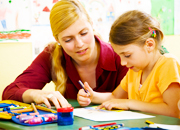Making sure experiences are age appropriate
When you are designing learning experiences, you must make sure they are age appropriate. Children of different ages will have different safety and development requirements. They may also have differing communication skills, so you may need to use observation techniques to discover what interests them.
You need to observe children to identify their interests and their developmental skills, and then you will be more able to create an environment which supports them. These experiences can be provided within routines and in response to individual needs.

It is important to monitor and closely observe the children’s reactions to the play environment to ensure they are interested and challenged. It is equally important to watch out for signs that an activity or piece of equipment is providing too many challenges, and causing frustration or discouragement.
There are particular strategies that can be used for each age group, but you will also find that many can be used across several, or even all, age groups. They just need to be varied according to the different developmental capabilities of the group. All these strategies require working with the children and basing the experiences and environment on the children's interests.
With older groups, encourage the children to generate ideas for experiences themselves and give them roles in the planning process. They may have particular hobbies that can be used to inspire activities. Vary your programming with all age groups for individual, small and whole group activities.
With all age groups, the communications you have with the families are crucial for planning your program. Families know the most about their child and can give you endless ideas, as well as information on likes and dislikes. By including everybody in a collaborative relationship that works to achieve the same goals, the program will run much more smoothly.
Read these resources for information on planning experiences for children of different age groups.
Planning experiences for 0-2 years age group
Planning experiences for 2-3 years age group
What interests the Outside School Hours Care (OSHC) group
Ryan finds that planning experiences for the OSHC group is quite different to planning experiences for the younger age groups. The OSHC children do a fair bit of the organising themselves. They decide what experiences they wish to do and what equipment and resources they need.
The OSHC children meet once a week to decide on what they'd like to do the following week. They also review their activities from the previous week to consider what they enjoyed and what didn't work as planned. It's a great learning experience for them!
Ryan acts as a facilitator to make sure everyone gets heard. He encourages the children to generate ideas for experiences themselves, and to be involved in the planning process of the program indoors and outdoors. The children may have particular interests or hobbies that can be incorporated in the program.
This is a great way for the children to work, as it teaches them so many things. Below are some of the skills the OSHC children might learn from their teamwork:
- patience
- co-operation
- turn taking
- respecting others
- compromise.
The OSHC group seems to favour experiences that involve:
- music
- sports
- organised games
- hobbies, such as pottery.
They do a lot of talking together to come up with the experiences that they wish to do. They also requested magazines to flick through. Sometimes they choose magazines that aren't appropriate, so Ryan just gives them a list that they can choose from.
The music, sports and hobbies that they favour change often depending on what is popular and in season at the time.
Design a short survey (about 5 questions) that could be given to the OSHC children (6-12 year olds) to identify their interests. Record it in your notebook, or on a larger piece of paper if you need more space.




